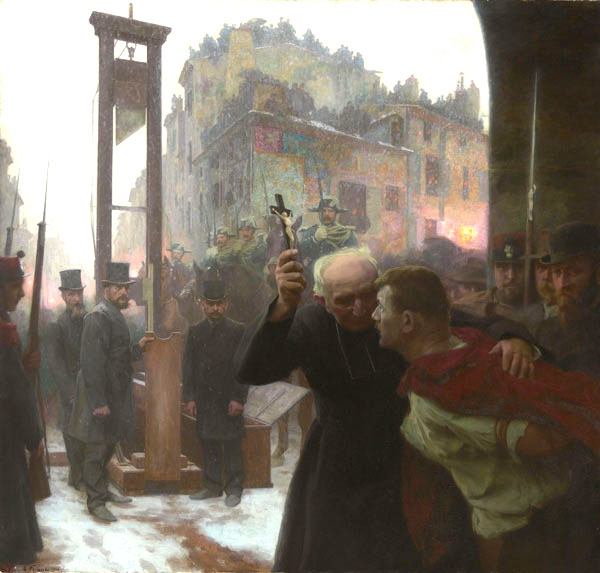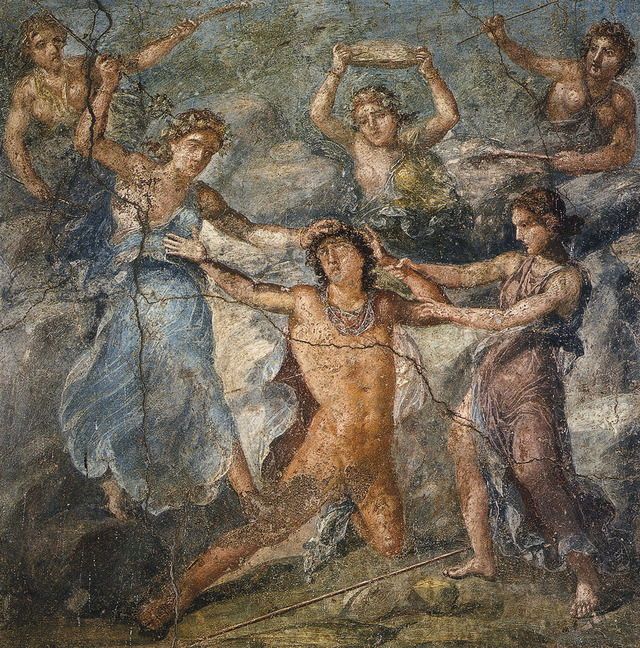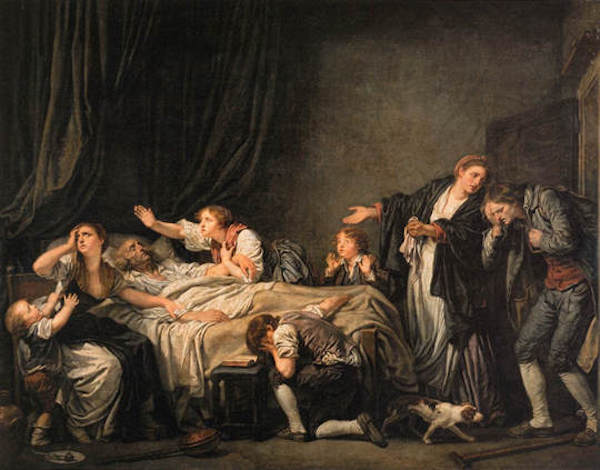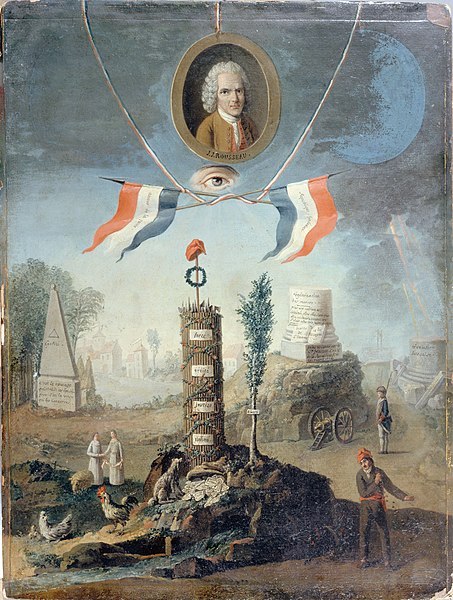The subject I’m tackling for WUKALI – justice and wickedness – has always been at the heart of ethics, morality and spirituality, from the most remote antiquity to the present day. It is even the epicenter of the concerns and questions of all humanity.
“Neither wicked nor unjust, in our actions as in our words”
Such a commandment (Aristotle, Treatise on Morality) is self-evident to any man of good will! But declared intention and goodwill are not enough… And to reconcile one’s ideals with one’s praxis presupposes – short of being a saint… – an exceptional knowledge and mastery of oneself, one’s impulses and motivations… It presupposes knowing how to flush out the bad faith behind all the justifications one gives oneself. It presupposes having, at last! become oneself, having achieved unity, the adequacy of the ego and the super-ego – as the good Siegmund would have said…
Difficult! I won’t define the words “wickedness” and “injustice”, whose meanings are all too familiar to us. Suffice it to point out the drift in meaning of the word “wickedness – a drift not foreseen by the equally excellent Émile Littré ! In the language of advertising, sport and business, “wickedness” has become almost synonymous with dynamism, strength and virility. It’s not certain, however, that this semantic shift is as innocent as it seems. Is it not the sign of a certain imbalance in our society, where, in particular, the discourse on sexuality is becoming freer, but hardly any sexuality? I wouldn’t go so far as to support the thesis that nastiness is always (like the quest for power) the compensation, the palliative of sexual misery… It’s remarkable, though, that people with a happy sexuality are generally affable and good company. Unlike humans, animals never kill within their own species, and killing a fellow animal can only be accidental. In fact, an animal’s sole aim is to establish its status as the dominant male – in order to (p)reserve a territory, one or more females… In humans, malice is often expressed through irony – always fuelled by a good conscience. As for so-called “witty” people, they are often nothing but malicious. And we all know – Parisianism is the most perfect example – of personalities who would stop at nothing, kill father and mother [as they say], for the pleasure of a word…

Emile Friant (1863-1932). Art Gallery, Hamilton, Ontario, Canada
Humor – the “politeness of despair” – on the other hand, is always marked by courtesy and respect. I’m not, of course, referring here to those pseudo-humorists who spread their fat laughter in media bashing or music hall. Notably cultivated by the British and the Jews, humor only laughs at itself… Which has led to the suggestion that, unlike sadism, humor is a matter of bad conscience, self-punishment, masochistic components of the personality, or even the death drive! But that’s going a bit too far…
Psychoanalyst Daniel Lagache goes so far as to inscribe the domination/submission relationship [known as sadomasochism] at the heart of human behavior… Well within the tradition of Sigmund Freud who, in his later years, came to consider man as naturally evil [unlike the good Jean-Jacques Rousseau, or at least who claimed to be so…], privileging the death drive over the life drive, Thanatos over Eros. Let’s face it, some Freudians – such as René Girard – deny the reality of this fatal drive. But I don’t feel in any way qualified to distinguish between these schools of thought – which, incidentally, are constantly anathematizing one another. In all confraternity, of course! In other words: “I’m convinced, but I’ll have my revenge”…

Fresque de Pompéi, maison des Vettii. 60 ap. J-C
If malice is a desire to humiliate, it is also [let’s repeat it] the sign of an intimate weakness, of suffering – which is, very often, nothing more than fear of the other, of being different. Fear of difference, of course, but also – paradoxically – of resemblance… A double imperative seems to govern our relationships with authority: “Imitate me as a model, but not as a rival ! So a master is always proud, and feels valued, to be taken as a model by his disciples, to see that mimesis works! But when a disciple imitates his model too perfectly and threatens to surpass him, the master – unless he has a genuine vocation – becomes jealous, hostile and denigrates his pupil. Mimetic rivalry punishes those who fail to make Zarathustra’s objurgation to his disciples their own: “Now, I order you to lose me and find yourselves! (Nietzsche Click )For it’s possible to speak the truth in bad faith, and to lie in good faith – if, at least, it’s a pious lie!
Although Equality cannot exist among men – due to the diversity of their genetic heritages and socio-cultural conditioning – Equity, on the other hand, remains possible… To be equitable, Justice must, in fact, be personalistic, considering each person in his or her singularity… However, a standardizing, accounting justice will always defend “the free fox in the free henhouse” (Rosa Luxembourg), reducing the human being to a quasi-abstraction…
Is this not still the sad reality in many of our supposedly democratic regimes? Let’s face it, though, it’s all too often intellectual laziness that leads us to standardize, to reduce everyone’s personality to the lowest common denominator. Isn’t it also comfortable to deny complexity, to practice amalgamation, to reduce the other to one of his or her characteristics – the civil servant, the executive, the cop, the shopkeeper, the teacher, the homosexual, the intellectual, the Jew, the Freemason, the Arab… With the other thus commodified, we can manipulate him or her with a clear conscience. And, if necessary – catharsis obliges – it will always be easy to make a scapegoat, an expiatory victim. “As Edgar Morin wisely observed: “Simplification is barbarism.

To be legal, Justice may not therefore be legitimate. The eternal dialectic between spirit and letter, reason and heart, Eros and Logos, Dionysian and Apollonian… Antigone violates Creon’s law – in the name of the Holy Illegality – to bury her brother Polynices… The right to rebel against the infamous law ! But rebellion against iniquity is only justified when the arsenal of legal means has been exhausted – otherwise the law of the jungle, individual justice, the murder of the burglar in the name of the “Legitimate Defense of Private Property” sets in. – To be fair is to have kept intact the virtue of indignation of our childhood – in a world where everything is a spectacle… How many Dreyfus cases would go unnoticed today – opinion now being mithridatized by a deluge of undifferentiated information, forbidding time for reflection… – To be fair is also to show civic courage, to refuse the clamor of the vox populi or political correctness… Although the example of civic-mindedness no longer comes from our governing bodies – for whom the watchword now seems to be: “I have to follow them, since I’m their leader! ” Ledru-Rollin (Click) – To be fair means, when someone has committed a misdeed, to try to understand his or her motives – which does not mean justifying them, as the existence of a sanction remains necessary… But a sanction should always be redemptive: if, indeed, society has a duty to protect itself, it does not have to return an eye for an eye, and a tooth for a tooth. It’s true that a criminal must be put out of his misery, but it’s also necessary to save what can still be saved…
For a child, authority is necessary and reassuring, while laxity generates imbalance and anxiety. Children – who have a highly developed sense of justice – are quite happy to accept deserved punishment, often with relief, as it relieves them of their guilt… Just look at the contempt in which teenagers hold those adults who are too weak or permissive, and who are satisfied with the role of buddy! And “tough love” is certainly not the outdated saying we’ve been led to believe…

Huile sur toile, 130 x 162 cm. Paris, Musée du Louvre.
If, on the other hand, a boss, or even a company director, doesn’t have to open up to his subordinates, they must feel – by the way they are informed and consulted – that they are respected! Whereas authoritarianism and refusal to dialogue – hierarchical forms of malice – are never, here again, anything but an expression of fear – fear of being called into question, of having to question oneself… Opacity is then a refuge! Although a process towards greater transparency and consultation has been underway in our society since 68, we are still a long way from meeting the expectations raised.
If there’s an infallible recipe for exorcising fear of the other, it’s surely elitism and its cheerful avatars. What could be more charming, in fact, than to imagine oneself the salt of the earth… Thus, in that privileged domain of elitism that is music [due to its abstract essence…], everyone is persuaded to hold the truth, to have made the right choice: from the rocker to the Opera subscriber, from Boulez to the accordion player, from the lover of rāgas to the supplicants of Coltrane, it’s everywhere the reign of good conscience and exclusivity! – Attacking someone on their musical tastes, isn’t that attacking them at their most intimate? When you can, of course, criticize his political, literary or pictorial options, without hurting his feelings… Music is also the privileged domain of social hatreds, classically underpinned by generational antagonisms. These hatreds are all the more tenacious because they are unspoken, unconscious… And everyone stigmatizes the tastes – whether of an illiterate plebeian, a backward-looking bourgeoisie, or snobs… – Anecdote: One day, when I was talking to a certain baroness (then head of a conservatory parents’ association) and making representations to her concerning access to music for the greatest number of people, didn’t she reply outright: “But music isn’t for scoundrels! ”

Nicolas Henri Jeaurat de Bertry (1728-1796)
If Intolerance is absolute Evil, then Tolerance is not Good, but a lesser evil – admitting the other only for pragmatic reasons. Necessitated by obligatory coexistence with fellow human beings of different origins or opinions, it is a regime of peaceful coexistence, without fraternity – of mutual indifference, at best!” Don’t do to others what you wouldn’t want them to do to you”, or again: ‘Please leave the premises in the condition you found them when you entered’, and so on. A minimal virtue, a morality of fear, Tolerance tells us “what not to do”, but certainly not “what to do”! [I’ll quote Paul Claudel for the record: “There are houses for tolerance”]. ( In French “une maison de tolérance” was the spicy name for brothel !)
Respect, on the other hand, includes tolerance, of course, but also admits empathy, sympathy, even compassion; it recognizes the other in his mystery, it is fraternal… Doesn’t it intimate: “Thou shalt love thy neighbor as thyself… but also thy farther!” [which is certainly not specified in the Scriptures]. See also Antoine de Saint-Exupéry’s admirable precept: “If you differ from me, my brother, far from harming me, you enrich me.”
At the top of this ethical hierarchy is Charity, not in the sense of material help, but in the sense of love, self-sacrifice and self-giving – not expecting reciprocity! As for a moral code of action, what better motto than that of the city of Amber in Francet: “Fais ce que dois, advienne que pourra!” (Do what you must, come what may)… Because, in the final analysis, isn’t the only judge of our actions our conscience, our inner self?
So will I end my typing with three quotes:
From Nietzsche: “To spare someone humiliation is the most human act.” Le gai savoir (Click)
From Proust: “The height of intelligence is kindness” (Click)
And from Vladimir Jankélévitch : “Goodness is like Music or Love, it’s done, not said” (La Musique et l’ineffable (Click), éditions du Seuil.
Illustration de l’entête: Pierre Paul Prud’hon (1758-1823), La Justice et la Vengeance poursuivant le Crime (1808). Huile sur toile, 243 × 292 cm. Louvre
You can find the original text in French or by clicking on the French flag
Write to us in ENGLISH
Contact : redaction@wukali.com .
Vous souhaitez réagir à cet article,
Peut-être même nous proposer des textes pour publication dans WUKALI
Vous voudriez nous faire connaître votre actualité
Pour nous soutenir, rien de mieux que de relayer l’article auprès de vos amis sur vos réseaux sociaux😇
Notre meilleure publicité c’est VOUS !


